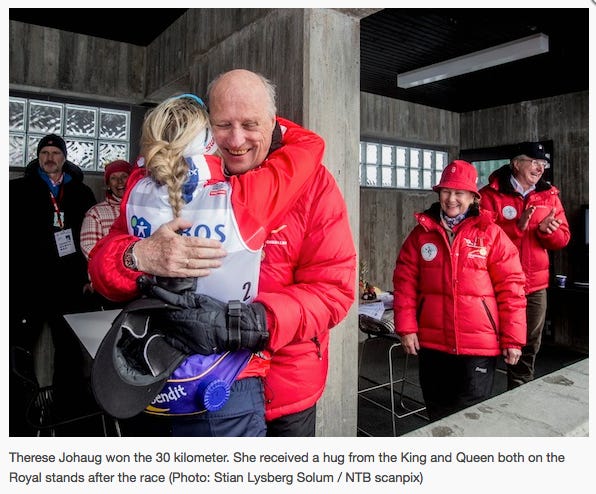'We failed you': Denmark’s Ekstrabladet holds that 'media…have been almost hypnotically trusting of the government’s Covid narrative'—and admits failure
This editorial appeared on 7 Jan. 2022 in Denmark’s largest (by circulation) daily newspaper, and it was written by Brian Weichardt. Now let's see when politicians man up and admit mistakes, too
Below you shall find today’s read from Scandinavia, which consists of a rather brief editorial by Brian Weichardt, which appeared in Denmark’s largest daily newspaper by circulation, Ekstrabladet, on 7 Jan. 2022
I shall append a brief sidenote at the bottom of the piece (I left the capitalised words as they appeared in the original; the highlighted passages in bold are my emphases).
Caption (omitted here): We failed. The messaging by authorities and politicians to the people in this historic crisis leaves much to be desired.
For ALMOST two years, we—the press and the population—have been almost hypnotically preoccupied with the authorities’ daily Corona narrative.
WE HAVE STARED at the movements of the numbers of infections, hospitalisations, and deaths with Corona. And we have trusted the importance of the numbers’ ever so smallest movements as laid out by experts, politicians, and authorities who have constantly warned us about the dormant Corona monster under our beds. A monster that lies there, and that is just waiting for us to fall asleep so it can strike under cover of darkness.
THE CONSTANT mental alertness has worn us all out tremendously. That is why we—in the media—must also take stock of our own efforts. And we have failed, too.
WE HAVE NOT been vigilant enough as gatekeepers when the authorities failed to answer what it actually meant that people are admitted to hospitals with corona and not because of corona. Because it makes a difference. A big difference, indeed. To be precise: official hospitalisation numbers have been shown to be 27% higher than the actual figures of hospital admissions, simply because they were admitted with Covid. We only know that now.
OF COURSE, it is first and foremost the authorities who are responsible for informing the population correctly, accurately, and honestly. The numbers of Covid infections and deaths should, for obvious reasons, have been published long ago in order for us to obtain the clearest picture of the monster under our bed.
IN ALL, the messages of the authorities and politicians to the people in this historic crisis leave very much to be desired. And, therefore, they are lying now, as they have been lying before, but now part of the population has lost confidence in them.
OTHER examples incl. that the vaccines are consistently referred to as our ‘super-weapons’, and our hospitals are called ‘super-hospitals’. Yet, our super-hospitals are allegedly under maximum pressure while almost the entire population is armed with these super-weapons. Even children have been vaccinated on a huge scale, which has not been done in our neighbouring countries.
IN OTHER WORDS, there is something here that does not deserve the term ‘super’. Whether it’s the vaccines, the hospitals, or a mixture of it all, is anyone’s guess. At the minimum, the authorities’ communication to the people in no way deserves the term ‘super’. On the contrary.
Sidenote
Well, it’s about darn time legacy media recognises its own (utter) failure. While Brian Weichardt’s editorial is certainly a step in the right direction, however tiny this step is, this piece is certainly evidence that the latest iteration of ‘the narrative’ is under severe pressure from something that was believed to have gone extinct some time: the almost mythical creature called ‘reality’.
Scandinavians have long exhibited a seemingly naïve trust in authorities and the like, and while I personally think they shouldn’t have been so trusting in the first place, in some regards this trust isn’t as misplaced as elsewhere (here’s looking at you, Central European politicians of all countries): of course, mistakes are made, but every now and then Scandinavians receive an apology.
As an aside, my impression is that because there’s no discursive distance between, say, royalty and the people—they all use the informal ‘du’ (thou) and there are few procedural differences between ‘the people’ and ‘the king’ (or queen), as evidenced, e.g., by Norwegian athlete Therese Johaug who, after winning the 30k cross-country (mass-start) ski world championship, also got a hug from the king and queen of Norway:
Sure, this may be circumstantial, and, yes, the picture is also wonderful propaganda for the monarchy.
As a counterargument, one may bring up that the English language, contrary to, say, German or most other European languages, similarly doesn’t differentiate between formal and informal ways of addressing each other. If you’re of this opinion, I’d state this: can you imagine, say, the British monarch to hug a sweaty athlete right after watching a 30k race (which, by the way, lasts at least some 80-90 minutes)?
So, one way or another, it might just be that Scandinavia will show (shame) the rest of Europe and North America to admit their mistakes.




"Now let's see when politicians man up and admit mistakes, too" it would be better if they would just disappear from our view and from our life. It's their shame. We know what they did and what (artificial) monster crisis they created. How we get out of this and move forward would be much better to do it without them
It has been noticed:
https://www.welt.de/politik/ausland/plus236257902/Corona-Berichterstattung-Wir-haben-uns-in-den-regierungstreuen-Chor-eingereiht.html